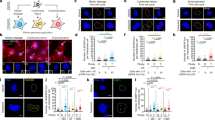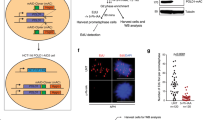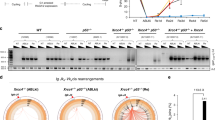Abstract
We previously reported that polo-like kinase 1 (Plk1) depletion by lentivirus-based RNA interference led to mitotic arrest and apoptosis in cancer cells, whereas normal diploid cell lines, hTERT-RPE1 and MCF10A, survived a similar level of depletion. To study homogeneous cell lines, we generated several Plk1-depleted hTERT-RPE1 and MCF10A clones that were derived from single cells depleted of Plk1. We found that in the long term, Plk1 depletion slowed proliferation of hTERT-RPE1 cells, apparently due to attenuated progression through S phase. These cells had altered morphology and were elongated compared with control. In contrast, MCF10A clones with mild levels of depletion showed no obvious phenotype. They appeared to have normal proliferation rates with no cell-cycle arrest. However, one MCF10A clone, which was severely depleted of Plk1, although viable, showed sporadic G2/M arrest and apoptosis. This MCF10A clone and all the hTERT-RPE1 clones displayed evidence of DNA-damage checkpoint activation. These data further support the interpretation that cancer cell lines have a much greater requirement for Plk1 than normal nontransformed diploid cells.
This is a preview of subscription content, access via your institution
Access options
Subscribe to this journal
Receive 50 print issues and online access
$259.00 per year
only $5.18 per issue
Buy this article
- Purchase on Springer Link
- Instant access to full article PDF
Prices may be subject to local taxes which are calculated during checkout





Similar content being viewed by others
References
Ando K, Ozaki T, Yamamoto H, Furuya K, Hosoda M, Hayashi S et al. (2004). Polo-like kinase 1 (Plk1) inhibits p53 function by physical interaction and phosphorylation. J Biol Chem 279: 25549–25561.
Angelis KJ, Dusinska M, Collins AR . (1999). Single cell gel electrophoresis: detection of DNA damage at different levels of sensitivity. Electrophoresis 20: 2133–2138.
Barr FA, Sillje HH, Nigg EA . (2004). Polo-like kinases and the orchestration of cell division. Nat Rev Mol Cell Biol 5: 429–440.
Bodnar AG, Ouellette M, Frolkis M, Holt SE, Chiu CP, Morin GB et al. (1998). Extension of life-span by introduction of telomerase into normal human cells. Science 279: 349–352.
Castedo M, Perfettini J-L, Roumier T, Yakushijin K, Horne D, Medema R et al. (2004). The cell cycle checkpoint kinase Chk2 is a negative regulator of mitotic catastrophe. Oncogene 23: 4353–4361.
Eckerdt F, Yuan J, Strebhardt K . (2005). Polo-like kinases and oncogenesis. Oncogene 24: 267–276.
Galy A, Neron B, Planque N, Saule S, Eychene A . (2002). Activated MAPK/ERK kinase (MEK-1) induces transdifferentiation of pigmented epithelium into neural retina. Dev Biol 248: 251–264.
Gerdes J, Lemke H, Baisch H, Wacker HH, Schwab U, Stein H . (1984). Cell cycle analysis of a cell proliferation-associated human nuclear antigen defined by the monoclonal antibody Ki-67. J Immunol 133: 1710–1715.
Gumireddy K, Reddy MV, Cosenza SC, Boominathan R, Baker SJ, Papathi N et al. (2005). ON01910, a non-ATP-competitive small molecule inhibitor of Plk1, is a potent anticancer agent. Cancer Cell 7: 275–286.
Hardy CF, Pautz A . (1996). A novel role for Cdc5p in DNA replication. Mol Cell Biol 16: 6775–6782.
Jiang XR, Jimenez G, Chang E, Frolkis M, Kusler B, Sage M et al. (1999). Telomerase expression in human somatic cells does not induce changes associated with a transformed phenotype. Nat Genet 21: 111–114.
Knecht R, Elez R, Oechler M, Solbach C, von Ilberg C, Strebhardt K . (1999). Prognostic significance of polo-like kinase (PLK) expression in squamous cell carcinomas of the head and neck. Cancer Res 59: 2794–2797.
Knecht R, Oberhauser C, Strebhardt K . (2000). PLK (polo-like kinase), a new prognostic marker for oropharyngeal carcinomas. Int J Cancer 89: 535–536.
Liu X, Erikson RL . (2003). Polo-like kinase (Plk)1 depletion induces apoptosis in cancer cells. Proc Natl Acad Sci USA 100: 5789–5794.
Liu X, Lei M, Erikson RL . (2006). Normal cells, but not cancer cells, survive severe Plk1 depletion. Mol Cell Biol 26: 2093–2108.
Mamely I, van Vugt MA, Smits VA, Semple JI, Lemmens B, Perrakis A et al. (2006). Polo-like kinase-1 controls proteasome-dependent degradation of Claspin during checkpoint recovery. Curr Biol 16: 1950–1955.
Rak DJ, Hardy KM, Jaffe GJ, McKay BS . (2006). Ca++- switch induction of RPE differentiation. Exp Eye Res 82: 648–656.
Smits VA, Klompmaker R, Arnaud L, Rijksen G, Nigg EA, Medema RH . (2000). Polo-like kinase-1 is a target of the DNA damage checkpoint. Nat Cell Biol 2: 672–676.
Soule HD, Maloney TM, Wolman SR, Peterson Jr WD, Brenz R, McGrath CM et al. (1990). Isolation and characterization of a spontaneously immortalized human breast epithelial cell line, MCF-10. Cancer Res 50: 6075–6086.
Spankuch B, Matthess Y, Knecht R, Zimmer B, Kaufmann M, Strebhardt K . (2004). Cancer inhibition in nude mice after systemic application of U6 promoter-driven short hairpin RNAs against PLK1. J Natl Cancer Inst 96: 862–872.
Steegmaier M, Hoffmann M, Baum A, Lenart P, Petronczki M, Krssak M et al. (2007). BI 2536, a potent and selective inhibitor of polo-like kinase 1, inhibits tumor growth in vivo. Curr Biol 17: 316–322.
Strebhardt K, Kneisel L, Linhart C, Bernd A, Kaufmann R . (2000). Prognostic value of pololike kinase expression in melanomas. JAMA 283: 479–480.
Strebhardt K, Ullrich A . (2006). Targeting polo-like kinase 1 for cancer therapy. Nat Rev Cancer 6: 321–330.
Takai N, Hamanaka R, Yoshimatsu J, Miyakawa I . (2005). Polo-like kinases (Plks) and cancer. Oncogene 24: 287–291.
Tsvetkov L, Stern DF . (2005). Interaction of chromatin-associated Plk1 and Mcm7. J Biol Chem 280: 11943–11947.
Tsvetkov L, Xu X, Li J, Stern DF . (2003). Polo-like kinase 1 and Chk2 interact and co-localize to centrosomes and the midbody. J Biol Chem 278: 8468–8475.
Weinstein IB, Joe AK . (2006). Mechanisms of disease: Oncogene addiction—a rationale for molecular targeting in cancer therapy. Nat Clin Pract Oncol 3: 448–457.
Winkles JA, Alberts GF . (2005). Differential regulation of polo-like kinase 1, 2, 3, and 4 gene expression in mammalian cells and tissues. Oncogene 24: 260–266.
Wolf G, Elez R, Doermer A, Holtrich U, Ackermann H, Stutte HJ et al. (1997). Prognostic significance of polo-like kinase (PLK) expression in non-small cell lung cancer. Oncogene 14: 543–549.
Acknowledgements
We thank Eleanor Erikson for critically reading the paper. This work was supported by National Institutes of Health Grant GM59172. RL Erikson is a John F Drum American Cancer Society Research Professor.
Author information
Authors and Affiliations
Corresponding author
Additional information
Supplementary Information accompanies the paper on the Oncogene website (http://www.nature.com/onc)
Rights and permissions
About this article
Cite this article
Lei, M., Erikson, R. Plk1 depletion in nontransformed diploid cells activates the DNA-damage checkpoint. Oncogene 27, 3935–3943 (2008). https://doi.org/10.1038/onc.2008.36
Received:
Revised:
Accepted:
Published:
Issue Date:
DOI: https://doi.org/10.1038/onc.2008.36
Keywords
This article is cited by
-
Crosstalk between Plk1, p53, cell cycle, and G2/M DNA damage checkpoint regulation in cancer: computational modeling and analysis
npj Systems Biology and Applications (2021)
-
Identification of inhibitors of the polo-box domain of polo-like kinase 1 from natural and semisynthetic compounds
Investigational New Drugs (2020)
-
Transcriptome response to heat stress in a chicken hepatocellular carcinoma cell line
Cell Stress and Chaperones (2015)
-
Centrosomal protein FOR20 is essential for S-phase progression by recruiting Plk1 to centrosomes
Cell Research (2013)
-
Polo-like kinase 1 (Plk1): an Unexpected Player in DNA Replication
Cell Division (2012)



